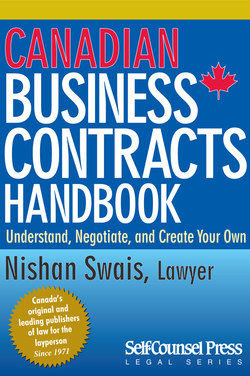Читать книгу Canadian Business Contracts Handbook - Nishan Swais - Страница 42
На сайте Литреса книга снята с продажи.
2.1a Individuals
ОглавлениеMost everyone can be a party to a contract, which is to say, most everyone can legally bind themselves to contractual terms. The “freedom to contract” is a cornerstone of most democracies and market economies. Where that freedom is restricted by law (e.g., in the case of guaranteeing a minimum wage), it is usually done in the form of restricting contractual terms and not the persons who can enter into contracts.
That being said, there are two notable classes of persons whom the law says cannot be legally bound by a contract, even if they have entered into it knowingly. These are minors and those who lack the mental capacity to contract. It is important for you to recognize the legal risks of doing business (from the point of view of contracting) with persons who belong to these classes.
Minors
A minor, generally speaking, is anyone younger than the age of 18 years old. (Note: the age of majority can vary by jurisdiction.) Most jurisdictions have laws that a contract entered into with a minor will not be enforceable because, in the eyes of the law, such persons generally lack the maturity and knowledge to protect themselves from unscrupulous commercial behaviour. The one exception to that rule is where a minor enters into a contract for necessaries. In some cases, the law will enforce a contract for necessaries against a minor (or his or her parents or guardians).
For example, if you sell a video game to a minor and, after having discussed it with his parents, they determine that he cannot really afford that purchase, the minor will be able to return the game and receive his money back from you. There is no meaningful sense in which a video game can be considered a necessary so it is likely that no court would enforce the contract (to purchase the video game) against the minor.
Needless to say, there are standards of reasonableness that a court will consider. For example, the minor wouldn’t be allowed by a court to come back to you six months later and demand his money back. Too much time will have passed.
Suppose, however, that the minor had purchased food or clothing instead of a video game. These, it could reasonably be argued, are necessaries. We require food and clothing to survive. Then again, are a bottle of soda and a baseball cap necessaries? They may simply be momentary indulgences, despite the fact that they are otherwise food and clothing. A court could overturn a contract for the sale of even those apparent necessaries.
The point is, minors do not have the capacity to contract at law (except in very limited circumstances) and persons contracting with minors should be aware that the contract will likely be considered invalid if it is ever brought before a court. In those situations, you are always better off contracting with an adult — the minor’s parents, in our example — who can act on behalf of the minor and legally bind themselves to the obligations they are assuming on his behalf.
Lack of mental capacity
The same caveat that applied to minors applies to persons who lack the mental capacity to contract. Such persons could include the elderly, the infirm, or those with mental challenges. Again, in an effort to protect such persons, the law will not enforce a contract against them.
It is worth noting that the person lacking mental capacity does not have to have been permanently in that state to avoid being bound by a contract. A lack of mental capacity can occur in instances where, at the time of entering into the contract, the person was being threatened (e.g., an “offer you can’t refuse”), under duress (e.g., suffered a recent, devastating personal loss), intoxicated, or otherwise mentally incapacitated.
A typical example is the frenzy that often accompanies the sale of residential condominiums. At one time, it was not unusual for sellers to create “now or never” sales situations in which prospective purchasers would have to decide on the spot and under immense psychological pressure whether they would buy a particular residential condominium. This often created a state of panic in purchasers who would then make decisions without having had the opportunity to properly consider the consequences. Clearly their capacity to contract had been affected. Indeed, so pervasive was that practice among condominium sellers that many jurisdictions enacted legislation that automatically grants a residential condominium purchaser the right to cancel their contract of purchase and sale within a certain number days after signing.
Again, it is important to be aware of the risks of dealing with persons who lack the mental capacity to contract.
